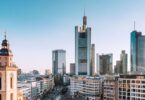There are many wealthy cities around the world like London, New York or Dubai. But many people often don’t realise that Africa also houses some of the planet’s richest metropolises.
One of them is Johannesburg in South Africa. Johannesburg is often called the “City of Gold” and is officially Africa’s wealthiest city with over 12,000 millionaires, 25 centi-millionaires (worth £100 million or more), and two billionaires, according to the Henley & Partners Africa Wealth Report.
So, it’s no wonder the city, known locally as Jo’burg or Joburg, has earned its place as the financial heart of the continent.
Most of Johannesburg’s wealth is centred in Sandton, an upscale area often described as “the richest square mile in Africa”.
Sandton is home to luxury shopping centres, five-star hotels, and the Johannesburg Stock Exchange (JSE), Africa’s largest stock market.
It’s a place where business and high-end living come together, attracting major companies and wealthy individuals.
But Johannesburg’s story begins long before it became the financial hub we know today. Its nickname, “City of Gold”, dates back to the 1880s when gold was discovered under the Witwatersrand hills.
That gold rush put Johannesburg on the map, attracting thousands of fortune-seekers and turning it into South Africa’s economic powerhouse.
Even today, gold mining remains a big part of the city’s identity. Just southwest of Johannesburg sits the Mponeng gold mine – the deepest mine in the world.
It reaches a jaw-dropping 2.2 miles (3.84 kilometres) below the Earth’s surface, and plans are underway to extend it even further.
At that depth, the temperature soars, and conditions are extreme, but Mponeng continues to produce vast amounts of gold, with reserves of over 46 million ounces.
Johannesburg isn’t just about business and mining, though. The city is packed with history and culture.
Visitors can explore important landmarks like the Apartheid Museum, Constitution Hill, and the vibrant streets of Soweto, which tell the story of South Africa’s difficult but inspiring past.
Today, Johannesburg is home to more than eight million people and is one of the largest cities in the world.
Its economy is booming, with industries like finance, IT, and manufacturing driving growth.
However, it’s not without its challenges. Issues like inequality, crime, and housing shortages remain, but urban renewal projects are working to make the city a better place to live.
Johannesburg is also a massive travel hub. OR Tambo International Airport is Africa’s busiest airport and connects millions of people to destinations across the globe each year.
Source link








